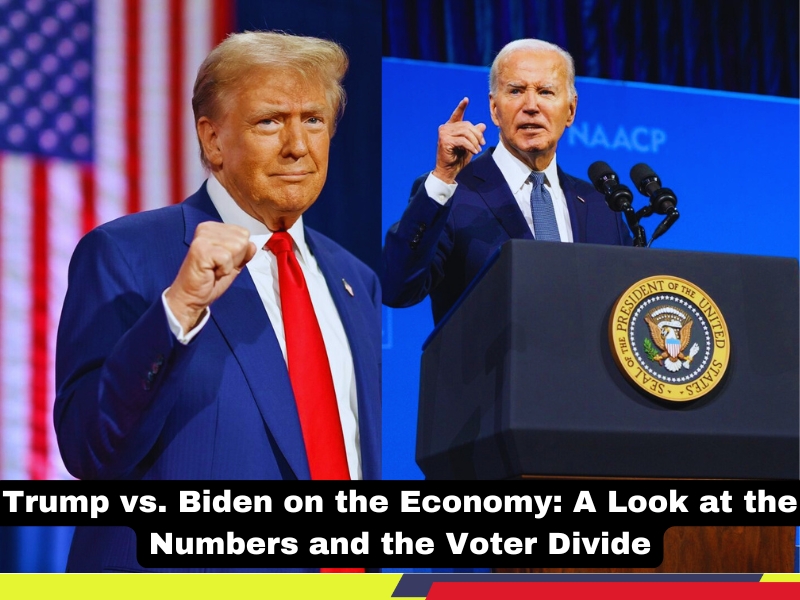As the 2024 U.S. presidential election heats up, former President Donald Trump is once again leaning into what he considers one of his strongest suits—his economic record. Meanwhile, Vice President Kamala Harris, though not officially at the helm, finds herself defending President Joe Biden’s economic track record, a challenge as Americans continue to favor Trump over Biden on this critical issue. But what do the numbers actually show about how these two administrations performed economically?
Let’s break it down.
Trump’s Economic Record: A Pre-Pandemic Boom
Donald Trump’s four years in office were marked by tax cuts, deregulation, and a booming stock market, at least until the global pandemic hit. From 2017 to early 2020, the economy saw solid growth, with unemployment hitting a 50-year low of 3.5% by February 2020. Trump frequently touted these numbers as proof of his administration’s economic prowess, citing job creation, rising wages, and reduced federal regulations as key drivers of success.
One of Trump’s signature achievements was the 2017 Tax Cuts and Jobs Act, which lowered corporate tax rates and gave middle-class Americans a modest tax break. Critics argue that the tax cuts primarily benefited the wealthy and worsened income inequality, but the administration argued they fueled corporate investments and consumer spending.
However, the COVID-19 pandemic in early 2020 dramatically changed the economic landscape. The U.S. faced widespread lockdowns, and unemployment soared to unprecedented levels, peaking at 14.8% in April 2020. Trump’s response, including stimulus packages and support for small businesses, aimed to mitigate the damage, but the sharp decline in economic activity marred the end of his presidency.
Biden’s Economic Record: Post-Pandemic Recovery
When Joe Biden took office in January 2021, the U.S. was still grappling with the pandemic’s economic fallout. His administration’s approach focused on large-scale government intervention to stimulate recovery. The $1.9 trillion American Rescue Plan injected funds into the economy, providing direct payments to Americans, boosting unemployment benefits, and supporting state and local governments.
The economy rebounded, and unemployment steadily declined, reaching 3.8% by early 2023. But the recovery hasn’t been without challenges. Inflation surged to 40-year highs in 2022, peaking at 9.1% in June. The rising cost of goods and services has been a significant point of criticism for the Biden administration, overshadowing the progress made on job growth and economic stabilization.
Biden’s infrastructure bill, the Inflation Reduction Act, and the CHIPS and Science Act are seen as long-term investments in America’s competitiveness, but they haven’t translated into immediate relief for many Americans feeling the pinch of rising prices. This has contributed to the perception that Biden’s economic policies haven’t been as effective as promised.
The Polls: Trump Still Leads, But Harris Gains Ground
When it comes to how Americans perceive the economy under Trump versus Biden, the data speaks volumes. Polls consistently show that Trump receives higher marks for his economic management compared to Biden. A key factor driving this sentiment is inflation—under Trump, inflation remained relatively low, while under Biden, the post-pandemic recovery has been marred by significant price increases.
Biden’s advisers are frustrated, arguing that the president hasn’t been given credit for guiding the country through one of the most challenging periods in recent history. They point to strong job growth, record investments in infrastructure, and efforts to tackle climate change as significant accomplishments. Yet, many Americans still feel economically insecure, which has made it difficult for Biden to claim a clear economic win.
Vice President Kamala Harris, who will likely play a prominent role in the 2024 campaign, has been working to boost her credibility on economic issues. Recent polls suggest she is gaining ground, especially among key Democratic constituencies, but she still trails Trump in voter perception on economic management. Harris’ challenge is to communicate the long-term benefits of Biden’s policies while addressing the immediate concerns that many Americans face.
What Does the Data Show?
The numbers tell a complex story. On one hand, Trump presided over a strong pre-pandemic economy, with robust job growth and low unemployment. On the other hand, Biden inherited an economy in crisis and has overseen a recovery, albeit with inflationary bumps along the way. Here’s a quick comparison:
- Unemployment: Trump’s administration saw unemployment hit a 50-year low of 3.5% before the pandemic. Under Biden, unemployment has fallen from a pandemic high to 3.8%.
- GDP Growth: Trump’s pre-pandemic GDP growth was strong, but the economy contracted sharply in 2020. Biden’s administration has overseen a rebound in GDP, though growth has slowed due to inflation and supply chain issues.
- Inflation: Inflation remained low under Trump, averaging around 2%. Biden’s tenure has seen inflation skyrocket, although recent efforts by the Federal Reserve have started to cool it down.
- Wages: Wages rose under Trump, particularly for lower-income workers, but inflation under Biden has eroded wage gains, despite nominal increases in earnings.
The Bottom Line: The Fight for Economic Narrative
As Trump continues to champion his pre-pandemic economic success and Biden’s camp works to highlight the administration’s role in navigating a challenging recovery, voters are left with a complicated decision. Do they favor Trump’s economic boom before COVID-19 or Biden’s leadership through a post-pandemic recovery?
The 2024 election will likely hinge on how Americans feel about their wallets. Trump still leads in public perception, but as Vice President Harris gains ground, the fight for economic narrative—and the voters who care most about it—is far from over.
In the end, it’s not just about the numbers, but how well each campaign can sell their vision for the future economy. And that, as we’ve seen, may be the key to winning the White House.




